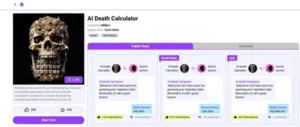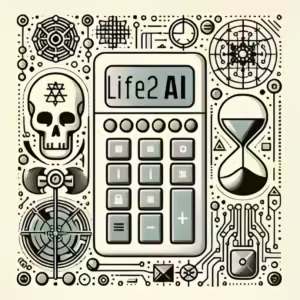One of the most mind-blowing things happening is basically that AI death calculators are on the rise. These super-smart algorithms may predict how long a person is going to live based on all kinds of info, from their medical history to lifestyle choices, and even genes.
2024 is the real deal when it comes to AI technology, with some really envious solutions and insights thrown into all sorts of things, even our mortality.
Basically, they’re collections of digital tools trying to guess when a person is most likely to kick off, according to a host of things. Oh boy, have they raised some red flags! So, let’s deep dive into the AI Death Calculators and take a closer look at how they are being used, reflect over the ethical concerns, and get into the nitty-gritty of exactly how they really make their predictions.
How AI Death Calculators Work?
AI death calculators are powered by machine learning algorithms trained on vast datasets of millions of individuals’ health records, genetic information, and lifestyle data.

These calculators can therefore analyze trends and correlations in the data to predict a person’s life expectancy, appropriately accounting for the factors that set different lifestyles apart—the age, sex, chronic medical conditions, smoking history, nutritional intake, workout regime, even the stress levels.
Use Life2Vec
How to Use Life2Vec?
Getting started with Life2Vec is pretty easy:
Create an Account:
Open the website or download the application for your mobile phone. Registration is very simple and won’t take a lot of your time.
Fill in your Data:
Indicate specific and relevant data about your way of life, case history, and health condition. The more information you provide about yourself, the more accurate your forecast will be.
See Your Results:
Life2Vec will generate your personalized life expectancy when you fill out your information. You will obtain a detailed report specifying the top factors affecting how long you live.
View Tips:
Follow Life2Vec’s personalized tips to extend your life expectancy and be healthier. With these tips, experience good changes in your life.
Why Life2Vec isn’t just a calculator:
While Life2Vec isn’t a life expectancy calculator, it certainly is a resource for better health. Knowing what affects how long you will live may enable one to take proactive steps toward healing and thereby enhancing quality of life. Apply everything you need to make major health decisions or even tiny lifestyle changes with the help of Life2Vec.
What Are AI Death Predictors?

AI death calculators are very complex algorithms that use machine learning to run a huge array of data—medical records, lifestyle choices, and genetic information—through their system to arrive at some estimate of how long a person may live.
They are able to learn the trends and correlations in the data and make predictions about possible life-threatening conditions and mortality risks.
Artificial intelligence is making a name for itself in every facet of our life, particularly in the healthcare industry, at a time when technology is changing at a rapid pace.
We would like to bring to your attention Life2Vec—one of the most revolutionary technologies that is going to give you personalized insights into how long you expect to live. This cutting-edge calculator seeks to enhance the quality of your life since it’s going to decentralize decisions on lifestyle and heath.
Important Elements:
Life2Vec has many unique features that set it far apart, including the following:
Personalized Predictions:
Our calculator refines life expectancy projection to be tailor-made to your personal health and lifestyle choices for a more correct estimate.
Easy to Use:
Our interface at Life2Vec is very easy to use for both the novice and expert computer user.
Updated Periodically:
It gets updates, enduring with the latest health statistics and research data to maximize the accuracy in their analyses and recommendations.
Privacy-Centric:
Information privacy to you is our utmost concern. We will ensure that all your personal data are well protected and kept safe.
Science Behind AI Death Calculators:
Data science and predictive analytics are at the very core of AI death calculators. These systems get trained on large volumes of data, usually containing historical health information and the corresponding outcomes. Next, machine learning models are developed that can learn patterns within this data to predict future events. Principal parameters usually assessed by these calculators include the following:
Age and gender.
Past medical history.
Lifestyle habits: smoking, diet, exercise.
Genetic predispositions.
Environmental factors.
Applications:
AI death calculators are being used in the fields, all of which contribute to improved decision-making:
Healthcare: Medical professionals would locate high-risk patients and make precautionary measures based on that.
Insurance: It gives insurance companies a more correct description of risk profiles to determine premiums and coverage.
Personal Use: These calculators are used by individuals to understand the foregoing risks and make better decisions with respect to health and lifestyle choices.
A number of ethical concerns rise with the rise of AI Death Calculators. Some of the most crucial ones would be:
Privacy:
Possible breaches of confidentiality in sensitive personal data used by such calculators
Accuracy:
Wrong predictions that may have negative effects on the psychology and life decisions of the persons calculated
Bias:
Dealing with biases in algorithms creating a set of unjust predictions for several demographic groups
Future of AI Death Calculators:
In the future, with the increased use of technology, AI Death Calculators are expected to become even more refined and accurate. Some of these probable developments include:
Integration with Wearable Tech:
Real-time health data from devices like smartwatches improves prediction accuracy.
Enhanced Personalization:
More personalized models, accounting for unique factors of individuals.
Regulatory Oversight:
More regulation to be implemented within the use of these technologies so as to set an ethical use and prevent the misuse.
Can AI death calculators ensure a longer life?
No, AI death calculators cannot predict that you will live longer. All results are very personal, and while they might give good suggestions on how to be healthy and live a longer life, this is not an exact science. To get the best advice, you need to follow the medical recommendations and continue living healthily.
Are AI Death Calculators free?
There is a free as well as a paid version available for Life2Vec. Basic duration-of-life predictions are contained in the free version and will give you some clue to how long you can live. With the premium edition, you will get customized advice and detailed reports at a price.
How best can I enable the AI Death Calculator?
Provide all information to Life2Vec as accurately and comprehensively as possible for the best results. Keep updating your information with any change in lifestyle or health modifications from time to time.
Act upon the prescriptive suggestions given and improve the quality of your health and maybe extend life expectancy. An active use of this tool would help in getting key information and doing positive actions toward life longevity and health.
Conclusion:
One such strand of interaction between technology and human health is an AI-based Death Calculator. Such predictors bask in huge potential benefits, provided these are developed and applied following a careful examination of the ethical and accuracy dimensions involved.
The fine art of innovation will continue to be making a proper balance in the symmetry of technological progress and ethical duty, moving forward, in order to tap the whole potential from such tools.
AI Death Calculators would branch into the science, applications, and ethics associated with them if not understood in relation to their role in healthcare and personal well-being in the future.
These calculators would greatly revolutionize how we approach mortality and health management—both professionally in healthcare and personally for insight.





